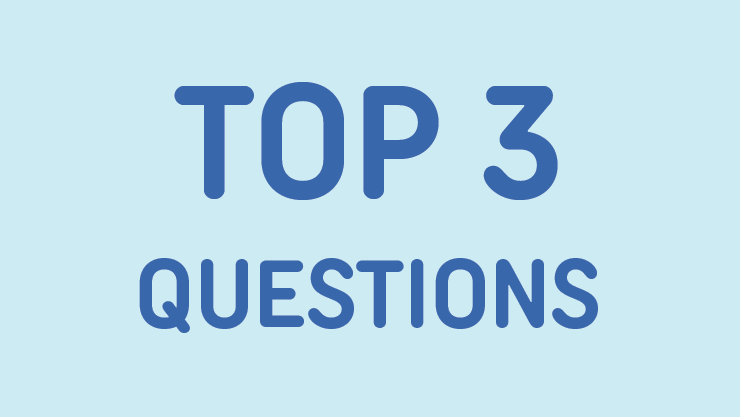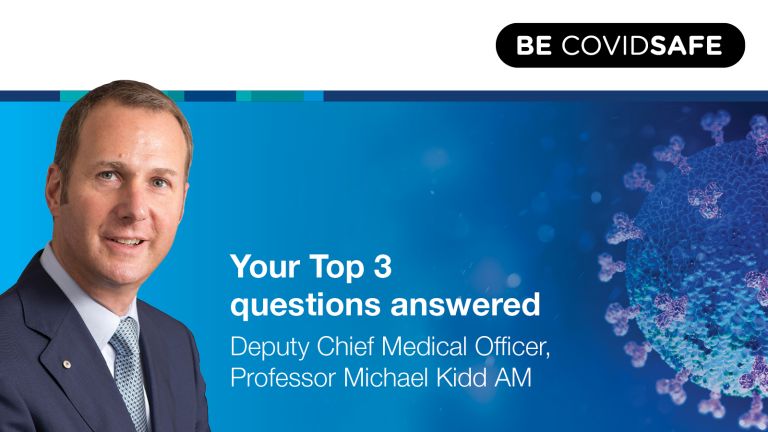
PROF MICHAEL KIDD: Hello and welcome to today’s Top 3. My name is Michael Kidd, Deputy Chief Medical Officer with the Australian Government, Department of Health. And very pleased to be joined by my Auslan interpreter.
This week, my shout out is to everybody who is involved in the vaccination program for 5-11 year old children right across Australia. Huge thanks to all the nurses, the doctors, the pharmacists involved in the 5-11 year old vaccination roll-out across the country. And a big thanks to all the parents and guardians who are taking their 5-11 year olds along to get their vaccines. And if you’re aged 5-11 and you’ve had your vaccine, big thanks to you as well for doing your part in protecting both yourself, your family members and everyone in Australia during the COVID-19 pandemic. We do know that some children become quite anxious when it comes to immunisations but our health care workers are doing a wonderful job putting children at ease and making this an a experience which hopefully is as painless as possible for everybody.
So our top three questions from you today… And the first question that you’ve got, is about, what are the reactions that 5-11 year olds may experience following their COVID-19 vaccine? So, the side effects of vaccines are very similar in 5-11 year olds as they are in teenagers and adults of all ages. And… So the most likely side effect is pain and swelling and possibly some redness at the sight of the injection. Children are as likely to get this side effect as anyone else and of course, if you do get these side effects, they usually only last a day or two. You can help to settle them down with a little bit of paracetamol, sometimes putting an ice cube in a tea towel and putting that on the injection site… A band-aid often also helps as well. Children may also experience fever or aches and pains after the vaccine, again, usually is only for a day or two after the vaccination has been given. And again, can be managed with fluids and some rest and again, some paracetamol. Side effect that we worry about with the Pfizer vaccines which we’re using for the childhood vaccination is the risk of myocarditis. Myocarditis is inflammation of the muscle of the heart, this is a very, very rare side effect. It looks like it’s even more rare in 5-11 year old children, if it does occur, it is usually mild and self-limiting but that is the side effect that we look out for. And the signs of myocarditis are… Can be chest pain or difficulty breathing, shortness of breath, feeling faint. So, obviously, if anything like that happens, seek urgent medical attention. But it is very, very rare and it is more likely to experience myocarditis as a result of being infected with COVID-19 than from the vaccines which are protecting us. So, that’s where we are. So, please, if you are aged 5-11 or if you have 5-11 year old in your family, please arrange for the vaccine. It’s two doses of the vaccine, the recommended period between the vaccines is currently 8 weeks and we’re very keen to get as many 5-11 year olds vaccinated as possible, to provide that level of protection to the children of Australia and also of course, the indirect protection to other members of the family and the wider community.
The second question today is, am I more likely to end up in hospital if I haven’t had a booster yet? Now booster doses of the COVID-19 vaccines are currently recommended four months after the second dose of your vaccine. Although that will be changing at the end of January to three months after the second dose of your vaccine and indeed some states and territories have already started delivering the booster doses at three months. It is important to get your booster dose, what the boosters do is they help to give added protection, they do as they imply, they boost your level of immunity, they give your immune system an extra boost in case you come in contact with the Corona-19… Sorry, the COVID-19 virus. So, please arrange to get your booster. What we know with the boosters, is those who are boosted, if you do come in contact with COVID-19, including the Omicron variant, you’re less likely to become infected. If you do become infected, you’re less likely to develop symptoms. And to be a risk of transmitting to other people, and if you do become infected, you’re less likely to be a risk of becoming seriously unwell and ending up in hospital.So, boosters do provide that added level of protection. If you’ve had two doses of the vaccine, you still have good protection but the boosters just make it a little bit stronger. The people who we’re worried about are the people who’ve not been vaccinated at all at this time. We currently have the 93% of people aged 16 years and above in Australia who’ve received at least two doses of a COVID-19 vaccine. But that still means we have about 7% of people aged 16 and above who have not yet received two doses of the vaccine. So, if you’ve only had one dose of the vaccine or if you’ve still yet to get vaccinated, please arrange to get your vaccine today, and there are appointments available right across the country and you can find out where the vaccine’s being administered through the vaccine checker at health.gov.au
Your third question is about Influenza and the question is, can I get Influenza and COVID-19 at the same time? And the answer is, yes. The two diseases are caused by different viruses but if the two viruses are circulating, and you come in contact with them, you can get infected with both Influenza and COVID-19. Now for the last two winters, we’ve seen very little Influenza in Australia. We’ve been protected by our closed international borders, by the quarantining of people when they come to Australia and by the physical distancing measures which have been in place. However, this year is likely to be different. Now with our borders open, now with us not requiring quarantine for people who are vaccinated against COVID-19 coming into Australia, there is the risk of Influenza coming into our country. And what we’re seeing for the first time in three years, in the northern hemisphere where it is currently winter is outbreaks of Influenza. So, it’s very likely we’re going to see Influenza in Australia this year and we could have a serious Influenza outbreak in Australia during winter.So, please arrange to get your Influenza vaccine when these become available, usually in April or May of this year. And yes, you can have a COVID-19 vaccine and an Influenza vaccine on the same day. My advice is that you get one vaccine in one arm, the other vaccine in the other arm so that if you do get side effects, you know which vaccine has caused the redness or the swelling or the discomfort. But it is safe to get both vaccines on the same day. It’s got to be really important this year, we’ve already seen the pressures on our hospital system and on our health care workers from the Omicron outbreak which we’re currently experiencing. We don’t want to see the additional pressures, which large amounts of people are being infected and becoming seriously unwell with Influenza, could result in as well. So, please, when it’s time, get your flu shot as well as of course, making sure that your COVID-19 shots and your boosters are up to date.
And that’s our Top 3 for today, so thank you everybody and thank you as always to my Auslan interpreter, thank you.
Top 3 vaccine questions
- What are the reactions 5 to 11 year olds may experience from the vaccine that we need to be aware of?
- Am I more likely to end up in hospital if I haven’t had a booster yet?
- Can I get Influenza and the COVID-19 infection at the same time?









